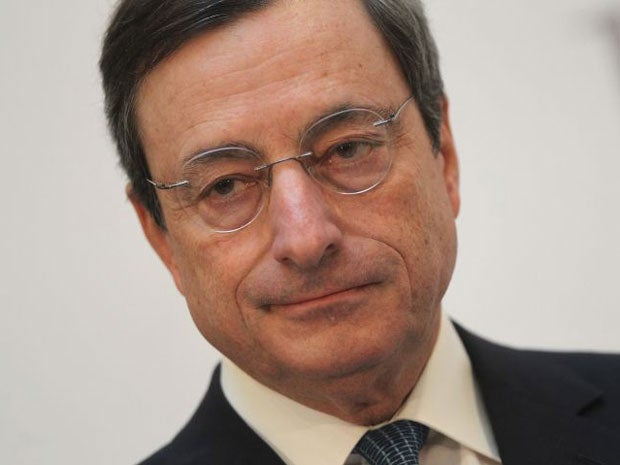Your support helps us to tell the story
From reproductive rights to climate change to Big Tech, The Independent is on the ground when the story is developing. Whether it's investigating the financials of Elon Musk's pro-Trump PAC or producing our latest documentary, 'The A Word', which shines a light on the American women fighting for reproductive rights, we know how important it is to parse out the facts from the messaging.
At such a critical moment in US history, we need reporters on the ground. Your donation allows us to keep sending journalists to speak to both sides of the story.
The Independent is trusted by Americans across the entire political spectrum. And unlike many other quality news outlets, we choose not to lock Americans out of our reporting and analysis with paywalls. We believe quality journalism should be available to everyone, paid for by those who can afford it.
Your support makes all the difference.European Central Bank president Mario Draghi says there is "no external saviour" for heavily indebted governments in the eurozone debt crisis and gave no sign the bank is ready to step in and support their finances.
Draghi said governments must take the tough steps to balance budgets and reform economies to promote growth.
"I will never tire of saying that the first response should be from government," Draghi said in a speech in Berlin. "There is no external saviour for a country that doesn't want to save itself."
As a "firewall" to calm markets in the meantime, Draghi said, the EU has its newly strengthened bailout fund.
Some economists have urged the ECB to support governments with bigger purchases of government bonds. So far the bank has made some purchases but kept them limited and said the programme is temporary, stressing that governments must not rely on such help from the ECB.
Draghi said that the purchases were "neither eternal nor infinite".
In his speech, Draghi focused instead on the European Financial Stability Facility, the current EU bailout fund, as the "firewall" against the crisis. He urged EU officials to quickly implement decisions to strengthen it to assure markets governments will pay their debts on time.
Governments have agreed on ways to increase the fund's lending power and are seeking outside investors such as countries in emerging markets to contribute to its lending power, so far without much progress.
Economists say the EFSF is too small to bail out Italy, the most recent focus of the debt crisis that has seen Greece, Ireland and Portugal seek bailouts from other eurozone governments and the International Monetary Fund.

Join our commenting forum
Join thought-provoking conversations, follow other Independent readers and see their replies
Comments